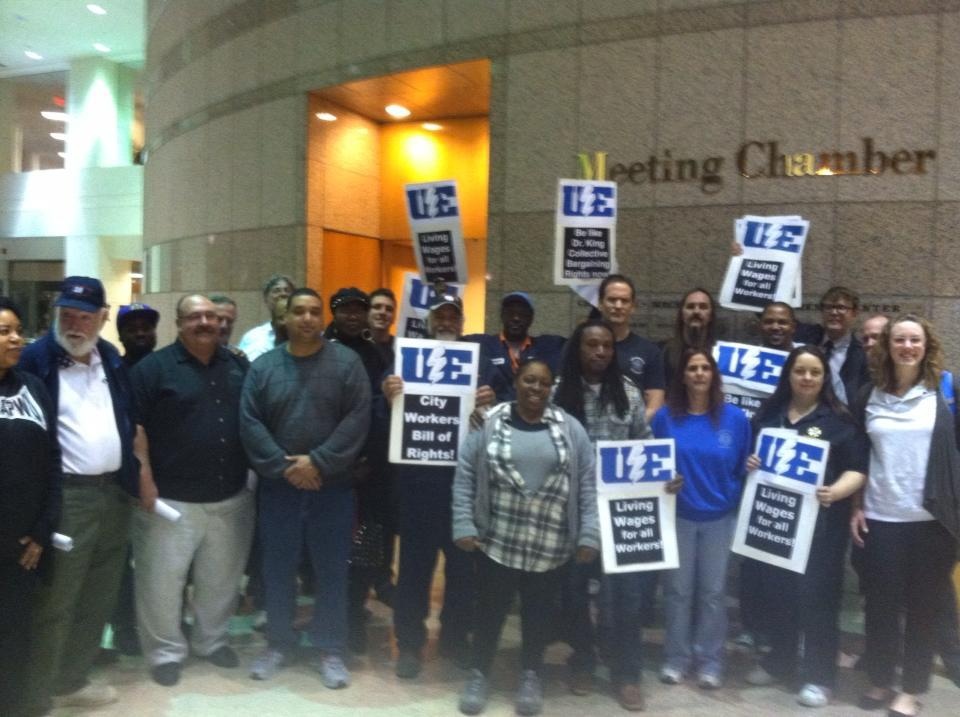Amid North Carolina anti-labor campaign, public workers score union win

North Carolina is already the least-unionized state in the nation, with a union membership rate of only 2.9 percent and a ban on collective bargaining by public employees. And if the new Republican governor and legislative super-majorities get their way, the state could soon become even more hostile to organized labor.
But despite the anti-labor assault underway in North Carolina, public workers' unions scored a key win this week in the state's biggest city.
On Monday, Charlotte City Council voted 6-5 to allow city employees to have union dues voluntarily deducted from their paychecks. Automatic dues collection is important to unions' success since it provides a reliable source of funds.
Six of the council's Democrats voted in favor of the program, while three Democrats and two Republicans voted against it. To participate, a union must pay the city a $1,000 annual fee to cover administrative costs, and there's no minimum number of members needed.
After the vote, members of the United Electrical, Radio and Machine Workers Local (UE) 150, the North Carolina Public Service Workers Union, gathered outside Charlotte council chambers to celebrate the organizing victory. The group has been campaigning for the policy for months.
"It shows they recognize the union, and the union's here," says James "Al" Locklear, a sanitation worker and president of the UE 150's Charlotte City Workers chapter. "The next step is to get people signed up and fight for better pay and treatment."
UE 150 currently has a recruitment drive underway in Charlotte. It is especially focused on organizing the city's sanitation workers, who face low pay, difficult conditions, and high turnover.
UE 150 already has paycheck dues deduction in the North Carolina cities of Raleigh, Durham and Chapel Hill, along with police and firefighters unions. Winston-Salem allows automatic deductions for members of police and firefighters unions, while Durham County allows them for members of the N.C. Sheriff Police Alliance, according to a recent city report prepared for Charlotte council.
Headquartered in Pittsburgh and representing both public and private-sector workers, the UE is one of the most democratic and politically progressive U.S. unions, with its rank-and-file control expressed in the slogan, "The members run this union." The more than 140 UE locals around the country are autonomous, and the salary of the union's top three elected officials is limited by the UE constitution to the top wage paid in the industry, currently about $51,000.
In North Carolina, UE 150 is one of the coalition partners behind the annual Historic Thousands on Jones Street march convened by the state NAACP and named after the street where the General Assembly meets. The coalition promotes a 14-point legislative agenda for social and economic justice, including collective bargaining for public employees.
UE 150 called for automatic dues deduction as part of a Worker's Bill of Rights it presented to Charlotte city officials last year. It held demonstrations in favor of dues deduction at city hall and lobbied for the cause during the 2012 Democratic National Convention held in Charlotte.
The Democrats' decision to hold their convention in the city proved controversial because of the state's low unionization rate and anti-union laws. North Carolina is among the so-called "right to work" states that make it illegal to require a new employee in a unionized shop to become a union member, thus weakening labor's ability to organize a workplace.
Even though the state already has a staunchly anti-union environment, its Republican leaders want to take further action to discourage organized labor. In a speech delivered last week to open the new legislative session, N.C. House Speaker Thom Tillis (R-Cornelius) told his body's GOP super-majority that North Carolina "will continue to be the least unionized state in the United States."
Tillis has called for enshrining right-to-work in the state constitution, as have Senate leader Phil Berger (R-Eden) and Gov. Pat McCrory. The Senate also has a Republican super-majority.
Including a right-to-work amendment in North Carolina's constitution is a goal of the state chapter of Americans for Prosperity (AFP), a conservative tea party group that was founded with support from David and Charles Koch of the Koch Industries oil and chemical conglomerate. The group made the announcement following last year's passage of right-to-work legislation in Michigan.
McCrory has close ties to AFP, having spent a year touring the state with the group to boost his conservative credentials after losing his bid for governor in 2008. He appointed as his state budget director discount retail baron Art Pope, a former national AFP director and a major financier of conservative advocacy groups that promote anti-union policies. Pope's family foundation is the second-largest funder of the AFP Foundation after the Kochs, and Pope and AFP both spent generously to help elect McCrory.
Weakening unions is also on the agenda of the American Legislative Exchange Council (ALEC), an influential organization that brings together corporations and legislators to promote model state legislation advancing business-friendly policies. Michigan's right-to-work legislation contained the same language as an ALEC model bill.
Many North Carolina lawmakers have ties to ALEC, and McCrory recently chose as his chief lobbyist former state Rep. Fred Steen (R), who served as ALEC's North Carolina chair and is on ALEC's board of directors.
"They're trying to bust the unions up," Locklear observes. "They can treat people every kind of way when they don't have a union."
Tags
Sue Sturgis
Sue is the former editorial director of Facing South and the Institute for Southern Studies.
